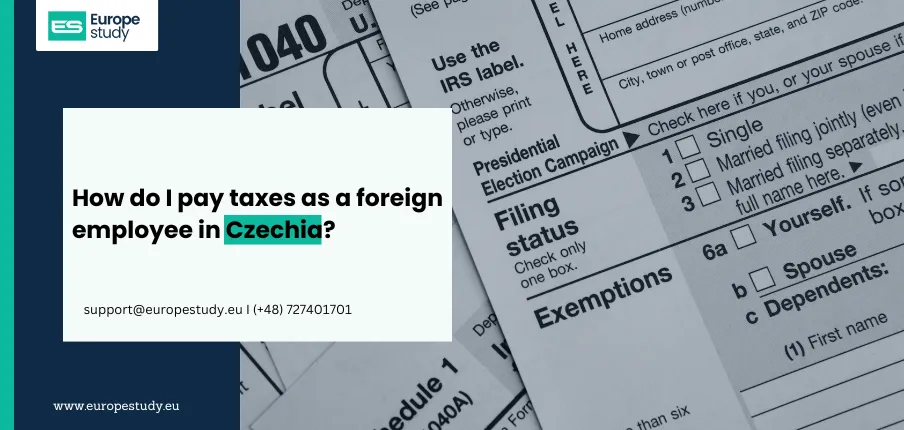
How do I pay taxes as a foreign employee in Czechia?
If you're a foreign national working in the Czech Republic (Czechia), understanding your tax obligations is essential for staying compliant and avoiding penalties. Whether you're employed by a local Czech company, a multinational corporation, or working remotely for a foreign employer, you may be subject to Czech tax laws depending on your residency status and income sources.
This guide walks you through the key aspects of paying taxes in Czechia as a foreign employee, including residency, tax rates, filing requirements, and more.
1. Determine Your Tax Residency Status
Your tax residency in the Czech Republic is the first factor that determines how your income will be taxed.
You are considered a Czech tax resident if:
- You spend 183 days or more in a calendar year in the Czech Republic, or
- You have a permanent home (habitual abode) in Czechia (not just rented accommodation but a place where you intend to reside long-term).
As a tax resident:
- You are taxed on your worldwide income.
- You must file a Czech income tax return annually.
As a non-resident, you are taxed only on income earned in the Czech Republic.
2. Income Tax Rates for Individuals
The Czech personal income tax system is relatively straightforward:
- 15% flat tax on gross income up to 1,582,812 CZK (as of 2025).
- 23% rate applies on income exceeding that threshold.
Example:
If your annual income is 2,000,000 CZK:
- The first 1,582,812 CZK is taxed at 15%.
- The remaining 417,188 CZK is taxed at 23%.
3. Social Security and Health Insurance Contributions
If you're employed by a Czech company, your employer will automatically deduct and remit:
- 6.5% for social security (employee contribution)
- 4.5% for public health insurance (employee contribution)
Employers also contribute a larger share:
- 24.8% for social security
- 9% for health insurance
If you’re working under a foreign contract (e.g., remote work for a non-Czech employer), you may need to register and pay these contributions yourself, depending on your residency and visa status.
4. Do You Need to File a Tax Return?
You must file a Czech tax return if:
- You are self-employed.
- You have multiple sources of income.
- You are a tax resident and earn foreign income.
- You are not part of your employer’s annual tax reconciliation.
If your only income is from a single Czech employer and you sign a "Prohlášení poplatníka" (employee tax declaration), your employer will handle your taxes through monthly payroll, and you may not need to file a return.
Filing Deadline:
- March 31st of the following year
- If submitted electronically or through a tax advisor: April 30th or July 1st, respectively
5. Tax Deductions and Credits
You may be eligible for tax deductions and credits such as:
- Basic personal tax credit (30,840 CZK/year for residents)
- Spouse credit (if applicable)
- Child tax credit
- Interest on a mortgage
- Private life insurance or pension savings
These are only available to tax residents.
6. How to File a Tax Return
You can file your Czech tax return:
- Manually (in paper form at the local tax office)
- Online through the Moje daně portal (https://mojedane.cz/)
- With the help of a tax advisor
You’ll need:
- Employer’s confirmation of taxable income ("Potvrzení o zdanitelných příjmech")
- Identification number (Rodné číslo or Birth Number, if applicable)
- Residency documents
- Details of foreign income (if you’re a tax resident)
7. Double Taxation Agreements (DTA)
Czechia has signed Double Taxation Treaties with over 90 countries. These agreements help prevent you from being taxed twice on the same income. If you’re taxed in your home country and in Czechia, the treaty will usually allow a tax credit or exemption in one of the countries.
To benefit from a treaty, you'll need to provide:
- Certificate of tax residence from your home country
- Proof of income and tax paid abroad
8. Penalties for Non-Compliance
Failing to comply with Czech tax obligations may lead to:
- Late filing penalties
- Interest on unpaid taxes
- Fines from social security or health insurance offices
Always check your status early and consult a tax advisor if unsure.
Conclusion
Paying taxes as a foreign employee in Czechia can seem daunting, but once you understand your residency status, income types, and filing responsibilities, the process becomes manageable. Whether you're employed locally or working remotely from Prague, knowing the rules ensures you remain compliant and can even take advantage of available tax benefits.





